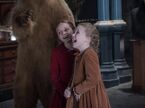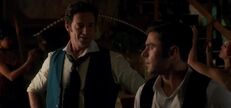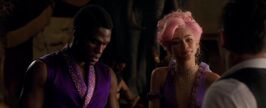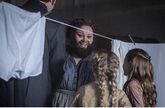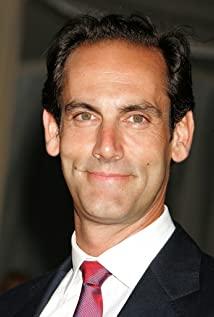After watching "The King of the Circus", I listened to the original soundtrack for two days on a loop. I love it so much. From the point of view of the movie alone, it is not perfect. Like many musicals, the story is mediocre. But like Barnum and the critics said in the movie, if you laugh, that's enough. The "play within a play" in the movie, that is, circus performance, echoes Barnum's phrase The noblest art is that of making others happy . It is no exaggeration to say that watching "The King of the Circus" I really burst into tears throughout the whole process. I knew it was too beautiful, but it was too unreal, but being able to be deceived by beauty is also considered a kind of happiness. The photography and editing are indescribably beautiful. At the beginning of the film, Uncle Hugh has a profile silhouette, half-singing and half-singing ladies and gents, this is the moment you've waited for, this moment alone is enough to make people scream. As soon as the camera turned, the fiery red dress was still quietly in the window, waiting for the big dreamer to grow up, and the connection was really clever.
The story told in "The King of the Circus" can also be called that you are born to be human, so you are worthy of pride, and this is what particularly moved me. Those who were once excluded and isolated can no longer hide themselves in the poor streets, but stand in the spotlight in bright clothes and sing This is me. Utopia? Of course. No matter how utopian it is, if it can appear on the big screen today, it will always come true one day, at least I believe so. This is a celebration of humanity.
[This is something I wrote earlier about P.T. Barnum, the prototype character in the movie, who is indeed a very interesting "big dreamer"]
lazy bad boy
Finnis Taylor Barnum was born in Connecticut in 1810. His ancestors were immigrants who came to the United States from England. Barnum's father, an ordinary sailor, went on to run a small grocery store, which is not unusual. The better one was Barnum's grandfather, an old gentleman who was a Whig, owns a certain amount of land, and was the local sheriff.
In fact, to be honest, I don't understand why this old gentleman would marry his daughter to old Barnum, who was not in the right family, or continue the string.
But the protagonist of our story was born like this, so everything is probably doomed.
Barnum was greatly influenced by his grandfather, who also loved this little grandson very much, but the old and the young got together and did nothing good. Along with his grandfather, Barnum learned to do all kinds of tricks in the process of buying lottery tickets, rounding up... It's also a lottery.
Young Barnum was exceptionally gifted at arithmetic, and when he was helping in his father's shop, he hated physical work the most. He suffocated his mind and came up with some deceptive promotions and various bargaining tricks to increase turnover. Perhaps it was because of his lack of ambition, that young Barnum was scolded by his father a lot. Even his father told him that if you die, don't worry about it, you will be the owner of a small shop in your life at best.
Probably Barnum's inner os at the moment is: It's not my fault that I don't want to go to work.
Metropolis has a way to make a living
During the three days of fishing and two days of net work in his hometown, Barnum basically relied on the income from lottery tickets to support his daily expenses. But in 1834 a Connecticut ordinance outlawed lottery trading, which made Barnum's livelihood a big problem.
Just like the name of a song in the original soundtrack of "The King of the Circus", The Other Side, there is no place for you to stay here, but a place for you to stay.
Barnum sold the small shop that his father had left for him and moved to New York with all his belongings. Here, he also took the first step towards becoming the "King of the Circus". This hairy boy who came to the metropolis will one day be as bright (human), colorful (handsome) and four (more) shooting (gold) as Uncle Hugh in the movie.
Uh... Although at the beginning, it was also abducted by cheating, the hero doesn't ask the source, doesn't it...
Having said that, Barnum's first job in New York, in today's professional terms, should be a curator. But what he exhibited was a black female slave named Joy Hayes, who suffered from eye disease, blindness in both eyes, and was almost paralyzed.
Barnum claims that Joy Hayes was 150 years old as a carer to President Washington.
It turned out that Joy Hayes died within a year, and was found to be less than 80 years old.
In 1842, Barnum began to open the "American Museum" known for its bizarre exhibits.
Although "exhibits" such as the Fiji Mermaid in the museum are obviously deliberately fake in order to attract attention. But Barnum opened up a new way of entertaining the general public with the performances in the museum by members such as "Thumb General" who are only 60 centimeters tall.
From "Freak Show" to "Golden Broker"
With tours as a member of the American Museum, Barnum also gained some performance and curatorial experience. Then he made a bold decision, which became the key to the peak of his career. When Barnum led the "General Thumb" and others to perform in England, he met the female singer Jenny Lind, known as the "Swedish Nightingale".
Jenny Linde not only sings like the sound of nature, but also has a gentle and dignified life. She even once made Andersen, the master of fairy tales, fall into unrequited love. Barnum immediately decided to invite Jenny Linde to perform in the United States, and offered a sky-high invitation fee of $1,000 per show.
At the time, Barnum also knew the risks of doing so, and he had to take on huge debts to pay for Jenny Lind's performance. It's definitely a high-stakes venture, and even Barnum isn't sure if it's going to work out, he said:
"The public is a strange creature, and while those of us in the entertainment business can speculate about their likes and dislikes, their tastes often change."
Fortunately, as soon as Jenny Linde set foot on the land of the United States, a large number of enthusiastic fans also came in droves. The pier and the entrance of the hotel were crowded with people to greet her. Barnum has only put his heart in his stomach until now. This should be a steady profit compared to buying and selling.
In 1850, Jeanne Lind sang at the Castle Garden Theater in New York City, and the performance was a sensation.
From speculators to entertainment tycoons, Barnum's keen sense of the public entertainment industry has to be admired.
It is said that before his death, his last words were: "How is the income of Madison Square Garden today?"
We can't say for certain whether those bizarre performances are Barnum's most obsessive and passionate careers.
Someone in the movie said to Barnum, 'It's all an illusion, it's a dream, what's the big deal.
But isn't it cool and powerful to create a fantasy that tens of millions of viewers fall into at the same time?
This article was originally published on December 19th, and the specific content has been deleted.
View more about The Greatest Showman reviews



